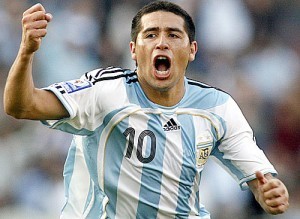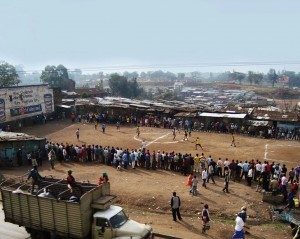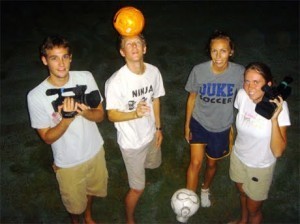Laurent Dubois's Blog, page 73
March 2, 2015
Temples of the Earthbound Gods

Christopher Gaffney’s book Temples of the Earthbound Gods offers us a rich geographical, culture, and ethnographic look at the way lives in Brazil and Argentina intersect with and our transformed by the space of stadia. What do you see as the most interesting contributions of this work? What kinds of theoretical approaches does he use in trying to understand what happens in and around the stadium? In what ways does his interpretive framework or insights help you understand experiences you have had in sports events?
As you grapple with these questions, feel free to read the comments made in 2013 by students in the Soccer Politics Class in response to a similar post.
February 28, 2015
Sobre los paisajes del fútbol africano…
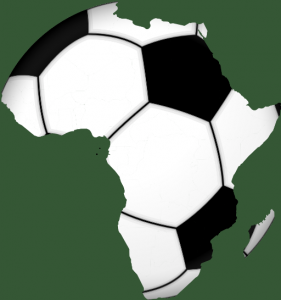
De Wikimedia Commons, el repositorio multimedia libre
En su libro African Soccerscapes, Peter Alegi contextualiza históricamente el surgimiento y el desarrollo del fútbol en el continente africano y ofrece interesantes puntos de reflexión sobre el rol del fútbol en los procesos de colonización y, posteriormente, decolonización de varios países africanos, así como su relación con los procesos de independencia, la urbanización y el capitalismo global. En este libro se explora el fútbol en toda su complejidad y se resalta su carácter multifacético y contradictorio: el fútbol es al tiempo utilizado como herramienta “civilizadora” por el imperio colonizador, y luego surge como una estrategia de resistencia contra ese mismo ente opresor; el fútbol es extranjero y ajeno pero luego es apropiado y transformado hasta volverse propio y autóctono.
Después de leer los capítulos asignados del libro, los invito a compartir sus opiniones y reacciones sobre la lectura en la sección “comentarios” debajo de esta entrada y respondiendo alguna/s de las siguientes preguntas:
¿Qué cosas nuevas aprendieron sobre el fútbol africano que antes no sabían? ¿Cómo cambió su forma de ver el fútbol africano después de leer el texto?
¿Hay algo que les sorprendió sobre el rol del fútbol en la historia del continente africano? ¿Por qué?
¿Hay alguna de las historias que cuenta Alegi que les llamó especialmente la atención? ¿Cuál y por qué?
Siguiendo el subtítulo del texto, según el autor, ¿cómo el fútbol cambió a África y cómo África cambió al fútbol?
African Soccerscapes
Peter Alegi’s book African Soccerscapes offers a careful account of the place of football in colonial Africa and the important role in played in the process of decolonization. Alegi, a Professor at Michigan State University, also maintains a blog called Football is Coming Home, and recently wrote about the first African Nations Cup.
This post is an invitation for you to share your thoughts and responses to Alegi’s work. What do we learn from this book? What are the most interesting or arresting stories he tells? How does the work help us understand the place of Africa in contemporary global football?
February 27, 2015
Le ventre de l’Atlantique, Fatou Diome
Même si presque personne ne se plaindra des jours de neige que nous avons eus ces deux dernières semaines (ce qui m’a d’ailleurs permis de découvrir le talent de sculpteur des enfants de mon quartier qui ont exprimé leur tristesse absolue de manquer l’école [ironique] en créant des bonhommes de neige grandeur nature), nous n’avons malheureusement pas pu discuter de l’un des deux livres du semestre écrits en français, Le ventre de l’Atlantique. Je vous invite donc à partager vos ressentis et vos opinions sur le texte et les problèmes soulevés ici.
Fatou Diome, née au Sénégal, a écrit ce livre, en partie autobiographique, on l’imagine bien, en 2003. Je vous recommande de regarder cette vidéo dans laquelle elle discute justement des thèmes abordés par son œuvre dans l’émission “Tout le monde en parle” (un “talk-show” présenté par Thierry Ardisson, qui est un animateur très connu en France, et qui, comme toute équipe de foot, a ses fans et ses détracteurs).
Vous pouvez ici partager votre analyse d’un passage marquant, d’un personnage qui vous a particulièrement interpellé, votre avis et ressenti sur le livre en général et/ou aborder ces questions :
Selon l’auteur, que représente l’Europe ou la France pour les Sénégalais ? Pour quelles raisons veulent-ils quitter leur pays ?
Comment les habitants de Niodior imaginent-ils le quotidien des émigrés en France ? Qui alimente cette vision ? Est-ce la réalité à laquelle les émigrés font face ?
Je vous encourage fortement à vous répondre mutuellement et à rebondir sur les messages écrits avant le vôtre pour que ce soit une forme de conversation écrite, et pas 14 messages à la suite sans rapport les uns aux autres.
February 26, 2015
No Confederations Cup for Qatar in 2021
On the heels of the news that the 2022 Men’s World Cup in Qatar will be held in the winter, FIFA yesterday announced that Qatar has lost its hosting privileges for the 2021 Confederations Cup. The reason: because summers in Qatar reach an average of 100ºF (38ºC). This fact is something the entire world has known for YEARS, is the main reason for the 2022 World Cup’s switch to November, and is one of the main reasons the general soccer community was against having the World Cup in Qatar at all (that and the whole “slave laborers” thing).
However, once again, this decision to give the Confederations Cup to another nation is too little, too late for FIFA. For one, the fact that FIFA’s justification for moving the Confederations Cup due to Qatar’s inability to combat these insane summer temperatures almost five full years after just about everyone in the entire world began pointing out that hey, maybe a summer soccer tournament in a desert nation is a horrible idea, only further displays FIFA’s disconnect. In addition, the Confederations Cup serves as a type of “test-run” to see how the stadiums, infrastructure, and country in general can operate a huge soccer tournament so that they can make tweaks the next year before the actual World Cup. Qatar especially needs that opportunity, since so much of its infrastructure is new and was built especially for the World Cup. Personally, I’m nervous now for the World Cup to be more of a disaster without the test-run this tournament provides. Despite FIFA’s seemingly good intentions for taking the Confederations Cup away from Qatar, this move will ultimately end up creating more potential for catastrophes at the 2022 World Cup in the long run.
February 25, 2015
Riquelme: The Artist Lays Down the Brush, One Month Later
When Boca Juniors manager Héctor Veira decided to give 18-year old Juan Román Riquelme his senior-level debut on November 10, 1996, he knew exactly what he was doing. What he saw was a young, strong, resilient central attacking midfielder with an incisive passing game and goal-scoring eye to match.
He would eventually metamorphose into an Argentinian and Boca Juniors icon, well deserving of the infamous No. 10 shirt, and would inspire millions of young children (including myself) to fall under the spell of the beautiful game. Perhaps Riquelme’s most outstanding quality, besides his passing and eye for the game, was his undoubted loyalty to his clubs and to his country.
Juan Román Riquelme was born June 28, 1974 in San Fernando, Argentina. The son of impoverished parents, Riquelme developed and fell in love with the game in the potreros – the vacant lots where Argentine boys played and dreamed. He played for several local clubs until he trialled and signed with Argentinos Juniors, before being bought for $800,000 by Boca Juniors and placed in their U-20 side. After a year with the U-20s he made his full professional debut against Unión de Santa Fe and two weeks later scored his first goal, a one-time swerving effort that went off of both posts and in, against Club Atlético Huracán.
After an impressive first season for the Argentine powerhouses, Riquelme was called up for his first senior game with the Argentine national team to face Colombia in a World Cup qualifier in 1997. Riquelme’s impactful performances continued in the 1997 U-20 World Cup in Malaysia, where he scored four goals in the tournament and led Argentina to their third title. Riquelme’s influence on the Boca team grew in subsequent years, becoming an integral part of the team that won the Argentine Primera División title three years straight (1998, 1999, 2000) and the Copa Libertadores in 2000 and 2001, taking the Argentine Footballer of the Year Award in those years as well. His performances in his formative years increased his potential to be a world star, and in November 2002, he signed with Barcelona in an €11m deal.
Unfortunately, Riquelme suffered a poor spell with the Catalan giants. Dutch manager Louis van Gaal barely insisted on playing him, and when he did, it was out of position as a winger (akin to his treatment of Juan Mata in today’s game). In 2003, he was shipped out on loan to fellow Spanish top flight club Villareal, where alongside Diego Forlán he played his best European football. At the end of the 2004-2005 season, Riquelme was awarded Most Artistic Player by Spanish magazine Marca, and the following year led his club on a ferocious run in the UEFA Champions League. That season, Villareal went undefeated in their Champions League group consisting of Manchester United, Lille, and Benfica, with Riquelme pulling all the strings from the middle of the park. “The Yellow Submarine” went on to beat Rangers and Inter Milan in the Round of 16 and the quarter finals, Riquelme again showing off his undoubted quality as a world class playmaker, before tragedy struck in the semifinal against Arsenal where he had a potentially game-tying penalty saved by Jens Lehmann that would have sent the game to extra time.
Although a rueful moment for Riquelme, he must remain proud that he played such a key role in putting Villareal, an ordinary mid-table club, on the European map. Riquelme would soon forget his travails, however, as he was called up in Argentina’s 23-man squad that summer for the World Cup in Germany. He would wear the fabled No. 10 shirt and start every game, making several key assists as he led Argentina to the top of their group, past Mexico in the Round of 16, and against hosts Germany in the quarterfinals. However, he did not have the chance to play past the 72nd minute, when he was substituted and Argentina went on to lose on penalties.
In 2007, he was sent out on loan back to Boca Juniors due to tense relations with the club’s board and manager, Manuel Pellegrini. He would continue playing for his boyhood club until 2012, winning the 2007 Copa Libertadores and being named Argentinian Player of the Year in 2008 and 2011 for guiding Boca to the championship, when he quit Boca before rejoining them in 2013 and moving back to Argentinos Juniors in 2014.
Why is this all important? Why focus and look back on Riquelme’s illustrious career now? It is because on January 25, 2015, exactly one month ago, the legend announced his retirement. As fans of the beautiful game, we hate to see our favorite players, the icons of the global game, have their careers slowly spiral downward until they inevitably draw the curtain. We as supports, in the past year, have seen legends like Henry, Zanetti, Seedorf, Giggs, and Puyol retire, never to grace the professional game again with their presence, and now we can add another legend to that list. But this is the cycle of football: welcoming new players with promise and potential from humble beginnings, watching their meteoric rise to fame and status before eventually returning down to Earth as humans, albeit humans who can score goals like these:
https://www.youtube.com/watch?v=psI9w4rE4FY
(Enjoy Ray Hudson’s commentary, too!)
Sources:
http://en.wikipedia.org/wiki/Juan_Rom...
http://www.theguardian.com/football/2...
The Decline of Serie A?
As of February 25th, 2015, Juventus is 9 points on top of the Serie A table. Unless they crash out unexpectedly, they are on course to win a consecutive 4th title. It has been a recurring theme that Juventus wins the league by a staggering amount – in the last season, they won the league by 17 points and in the 2012/13 season, they won the league by 9 points. In comparison with the other European leagues, Serie A seems to have become less competitive. What exactly has happened to the Serie A? Additionally, why is it so easy for Juventus to win the league, but struggle to do well on the Champions League stage?
Juventus has been dominating the Serie A after Inter Milan dominated the league from 2005 to 2010. However, unlike Juventus, Inter Milan also did incredibly well on the international level, becoming the first team in Italian history to win the treble in 2010. At the end of 2010, it seemed that Italy is at the forefront of European football. There were many great teams – Inter, AC Milan, Roma, Juventus – and the talent was overflowing. Yet today, Inter Milan is currently 8th in the league; AC Milan is not even competing in the Champions League; Napoli and Roma are doing well, but Juventus is perhaps the only real force in Italian football.
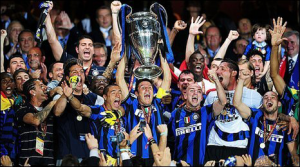
Inter Milan winning the 2010 UEFA Champions League
Even though Juventus is doing well in the Serie A, they have lacked the same fortune on the international level. Italian teams have won the Champions League 12 times, which is the 2nd most of any nation, with only Spain doing better with 14. However, in the past 11 years, Italians teams have only won the Champions League twice. Juventus has not made it past the quarter-finals since losing to Milan in the 2003 final. The way it is currently going, it might be a while until an Italian side wins another one.
Comparing Juventus to their Spanish (Barcelona and Real Madrid), German (Bayern Munich), and English (Chelsea) counterparts, they are nowhere to be found. Their international counterparts are all known to dominate both domestically and in Europe. Additionally, unlike the current situation in Serie A, the English league usually faces fierce competition with only a few points separating the top 4 teams. These teams have all proven they can hold their own in club football’s biggest competition in recent years. While performance in the Champions League doesn’t determine everything, it is a way to evaluate which clubs are doing well on the international level. This is a far cry from the times when Inter Milan were dominating the football world, AC Milan was still a highly competitive team, and Juventus was still rising up the league.
Something that may be contributing to this decline is the aging nature of many squads. Take Juventus for example – Buffon (37), Evra (33), Tevez (31) and Pirlo (35) are all nearing the twilight of their careers. However, it seems that the Serie A is also having trouble attracting young talent, as most of the younger players choose to join English, Spanish or German teams. Additionally, big stars have been continuously leaving the league. In 2009, the Serie A lost two huge stars in Kaka and Zlatan Ibrahimovic. This loss may have been another step in the process of Serie A’s decline while setting up the supremacy of the Spanish and English leagues. The economic crisis in Italy may also play a factor, as many teams cannot find agreement with the local government on how renovations and upgrades to stadiums should be financed.
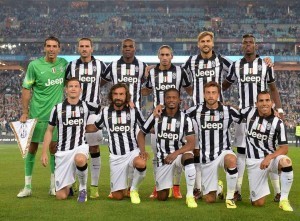
The Juventus squad for the 2014-2015 season
It is clear the current state of Serie A is in decline. Right now, the top team in Italy, Juventus, is a long way from the standards that Real Madrid, Barcelona, Bayern and Chelsea have set in European football. Some may argue that Serie A has now become a rather boring and predictable league that is void of much competitive spirit and quality. However, the nature of football is cyclical and it has shown the resurrection of teams that have fallen. It may be a long and difficult journey towards that one day that Serie A could once again reign supreme, but here’s to hoping that the Italian teams and fans will begin to work towards this goal.
Sources:
http://bleacherreport.com/articles/20...
http://www.bbc.co.uk/news/business-26...
Pelada et les voyages à découvrir le foot
Avec beaucoup des manières différents, le foot est un sport qui engager des gens sur tout le monde. Pour beaucoup de pays, le foot s’appelle « le sport universelle ». Mais pourquoi ? Dans les lectures, les discussions, les films et les textes pour notre cours, nous pouvons réaliser une pléthore des raisons. Ce sport n’est pas très cher, on peut le jouer avec juste les gens et un objet qui peut symbolise le ballon. Aussi, le sport est très simple, avec des règles très compréhensives.
Dans le film Pelada on peut voir l’universalité du foot dans les voyages de Luke Boughen et Gwendolyn Oxenham, ils ont engagé avec les « peladas » ou des jeu du foot « pick-up ». Luke et Gwen ont voulu de trouver l’esprit du foot, les raisons pourquoi il est un jeu de la publique. En passé, ils étaient joueurs du foot à Duke. Quand ils filmaient, ils ont se découvert plus en plus, et ce qu’ils voulons être dans l’avenir.
Pendant leurs voyages, ils ont visité Bolivie où ils ont joué du foot avec des prisonniers. Pour eux, le foot est une façon d’échapper leurs vies dures. En Brésil, ils ont trouvé une jeune fille qui aime le foot avec beaucoup de passion. Sa mère a dit que le foot « Est un sport, est un avenir, il est le chose que toute le monde veut, et il est la chose que tout le monde aime. » Aussi, ils ont visité Kenya, et ils ont joué du foot avec des brasseurs d’alcool de contrebande. Luke et Gwen ont appris comme la vie dur des brasseurs. Si les brasseurs jouent du foot, ils n’ont pas les temps pour brasser d’alcool, et ils n’ont pas beaucoup d’argent. Mais le foot, c’est la chose qui réunit les gens.
Pelada est un film très authentique, très compréhensif, est très identifiable. La voyage du Luke et Gwen ouvert d’esprit de la compréhension des vies de tout le monde. Le foot offrit un sanctuaire pour les gens partout.
On peut voir Pelada ici.
The Other Broken System in Greece
Recently, Greece has been in the news. Their economic situation pushed them to near bankruptcy and the other European nations decided that they would no longer support a defunct system without the Greek government submitting a list of planned reforms. The newly elected left-wing government, after failing to change the Euro Zone’s austerity policies, turned in a list earlier this week. However, this new government has also been dealing with another seemingly broken system: the Greek football leagues.
For the third time this year, the Greek government suspended the Super League and the Football League due to violence during matches.
“What we have been informed is that the Super League and the Football League have been suspended indefinitely,” Super League president Giorgos Borovilos told reporters.
“We have a new government who are looking to bring this subject up for discussion and implement state laws related to it.”
In September, violent fights erupted between fans at a third division match between Ethnikos Piraeus and Irodotos. Tragically, one fan died. The government suspended all matches for one week.
Then, in November, tempers flared at a larger match and led to the hospitalization of an assistant director of Central Refereeing Committee (KED). Once again, the government was forced to step in and halt games.
On Wednesday, February 25th, the government suspended the leagues for the third time. This decision follows two major incidents in the preceding week.
First, a massive brawl exploded at a match between Olympiakos and Panathinaikos last weekend.
The video shows the riots before the match and the flares that had to be used to calm down fans. Although the teams have a long rivalry, the riots show a pattern of violence and a lack of control by the football leagues.
Second, a brawl erupted between club officials at a board meeting on Tuesday. This brawl between actual league organizers seems even more indicative that the leagues need reform. As Stavros Kontonis, the deputy minister for sport in Greece’s new left-wing government, told national TV news channel Skai, “When we see this violence from the stadium go to a boardroom of a football institution, then you understand that the situation is completely out of control.”
Earlier this year, Kontonis privately stated that the league would be suspended next year unless every club in the league of 18 introduces smart-card ticketing and security camera systems at future fixtures.
The Greek soccer leagues’ issues further illustrate the breadth of soccer. While soccer can be used as a world stage for many athletes, it also represents much more than a game for its fans. At times, the emotions of the game can be too powerful for its spectators. Frustrations at Greek’s economic and political struggles could easily factor in and cause tempers to explode amongst the normal people.
Interestingly enough, the soccer leagues can also be seen as a microcosm of Greece as a nation. The league organizers parallel the Greek government, the fans mirror the taxpayers, and the Greek government coincides with the Euro Zone. As the league organizers have started to lose control of the fans, the Greek government has given the leagues an ultimatum regarding their continued existence. Hopefully, both the soccer leagues and the Greek government will actually follow through on their promised reforms.
The UEFA Champions League – Must See TV
Inspired by the pair of UEFA Champions league matches that I watched yesterday afternoon (for anyone following, Barcelona beat Man City 2-1, and Juventus beat Dortmund 2-1), I decided to do a little more research into what is my opinion, one of the best annual sporting tournaments in the world.
The UEFA Champions League is an annual tournament in which top-flight clubs from various European leagues square off to be crowned Champion of European Football. Although a nearly identical European-wide club competition, the European Cup, had been in existence as early as 1955, it was only in 1992 when UEFA, the Union of European Football Association, began to formally oversee operation.

Bayern Munich after winning their second consecutive European Cup title in 1976. Courtesy of http://bundesligafanatic.com/a-histor...
The European Cup comes from incredibly humble beginnings, initially established as “wednesday night challenge tournament” by Gabriel Hanot, then-editor of famous French sports daily, L’equipe. In an effort to make it a European-wide tournament, L’Equipe invited clubs from various European leagues, inviting clubs that they “considered had the most fan appeal.” Real Madrid emerged victorious in the first ever European Cup, and would go on to even win 4 more consecutive titles. With participation from clubs such as Real Madrid, Milan, and Eindhoven, the tournament immediately garnered immense interest, and continued to build off of that interest in the following years.
By 1992, UEFA overtook operations, renaming the tournament the UEFA Champions League. With it, UEFA brought major changes to the tournament. Prior to the 1992 season, invitation had only been extended to those clubs that had won their respective European league. What had only once been a knockout tournament expanded into a group stage. Coupled with the group stage addition, UEFA also expanded invitation to include those that had finished as runner’s up in their respective leagues. Though qualifiers and group stages have expanded to include more clubs and games since the 1992 changes, tournament structure today remains quite similar. Invitation is also a little more complicated then it had been in 1992, now decided by a UEFA coefficient ranking, calculated over a 5-year basis (to see the 2014/2015 coefficient rankings: http://www.uefa.com/uefachampionsleag...)
Real Madrid is the most successful club in the UEFA Champions League tournament with 10 titles to their name. They are followed by AC Milan seven titles, Liverpool and Barcelona with five, and Barcelona and Ajax with four.
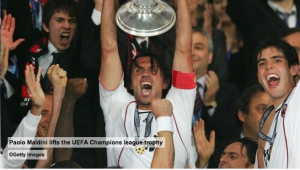
Paolo Maldini and AC Milan celebrate their seventh UEFA Champions League title in 2007. Courtesy of http://www.uefa.com/uefachampionsleag...
In my opinion, few tournaments capture that competition and excitement that the UEFA Champions League provide. As it matches the best teams in each domestic league, it provides bragging rights for both club and country. It seems as if story lines encapsulate each season in dramatic fashion – whether these story lines be the AC Milan-Liverpool saga in 2005 and 2007 or the all Madrid final in 2014.
I think a big reason behind UEFA’s success is the sheer star power that it encompasses. The Champions League provides a perfect stage for some of the world’s greatest soccer players to showcase their skills to the world at large. Players such as Messi, Cristiano Ronaldo, Di Stefano, and Henry have all displayed to the world why they are each regarded as some of the all-time greats through their Champions League performances. Although there does exists a CONCACAF Champions League, it certainly does not provide the parity and star power that is eminent with its European counterpart. With all of the allure and magic behind it, the UEFA Champions League is able to appeal to even the most casual of soccer fans.
If you have not watched, I highly suggest that you tune into either of today’s matches. Athletico Madrid and Bayer Leverkusen, and Arsenal and AS Monaco respectively square off today at 2:45pm et. Though I am not the most diehard of soccer fans, I always seem to gravitate towards UEFA Champions League matches. The constant parity of the tournament will always result in some form of drama, and will always keep you on the edge of your seat.
information courtesy of:
http://www.uefa.com/uefachampionsleag...
Laurent Dubois's Blog
- Laurent Dubois's profile
- 44 followers


